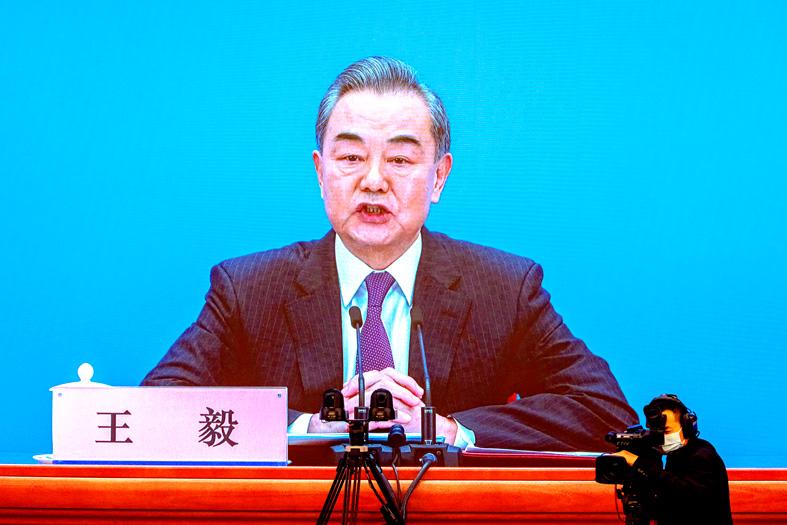Chinese Minister of Foreign Affairs Wang Yi (王毅) yesterday warned the administration of US President Joe Biden to roll back former US president Donald Trump’s “dangerous practice” of showing support for Taiwan.
China’s claim to the nation is an “insurmountable red line,” Wang told a news conference during the annual meeting of the Chinese National People’s Congress.
The US has no official relations with Taiwan, but has extensive informal ties. Trump irked Beijing by sending Cabinet officials to visit Taiwan in a show of support.

Photo: EPA-EFE
“The Chinese government has no room for compromise,” Wang said.
“We urge the new US administration to fully understand the high sensitivity of the Taiwan issue” and “completely change the previous administration’s dangerous practices of ‘crossing the line’ and ‘playing with fire,’” he said.
Biden has said he wants a more civil relationship with Beijing, but has shown no sign of softening Trump’s confrontational measures on trade, technology and human rights.
Wang gave no indication of how Beijing might react if Biden does not change course, but the Chinese Communist Party has threatened to invade if Taiwan declares independence or delays talks on uniting with China.
Wang’s comments in a wide-ranging, two-hour news conference reflected Beijing’s increasing assertiveness abroad and rejection of criticism over Hong Kong, Xinjiang and other sensitive topics.
Wang defended proposed changes in Hong Kong that would tighten Beijing’s control by reducing the role of its public in government.
He dismissed complaints that the proposal would erode the autonomy promised to the former British colony when it returned to China in 1997.
Beijing needs to protect Hong Kong’s “transition from chaos to governance,” Wang said.
The proposal would give a pro-Beijing committee a bigger role in choosing Hong Kong legislators. That would be a marked reduction of democracy and Western-style civil liberties in Hong Kong.
Chinese officials have said they want to make sure the territory is controlled by patriots.
“No one cares more about the development of democracy in Hong Kong than the central government,” Wang said.
He said the changes would protect the “rights of Hong Kong residents and the legitimate interests of foreign investors.”
Wang also rejected complaints that Beijing’s treatment of predominantly Muslim ethnic minorities in Xinjiang amounts to genocide.
“The so-called existence of genocide in Xinjiang is absurd. It is a complete lie fabricated with ulterior motives,” Wang said.
He blamed “anti-China forces” that he said want to “undermine the security and stability of Xinjiang and hinder China’s development and growth.”

A Chinese aircraft carrier group entered Japan’s economic waters over the weekend, before exiting to conduct drills involving fighter jets, the Japanese Ministry of Defense said yesterday. The Liaoning aircraft carrier, two missile destroyers and one fast combat supply ship sailed about 300km southwest of Japan’s easternmost island of Minamitori on Saturday, a ministry statement said. It was the first time a Chinese aircraft carrier had entered that part of Japan’s exclusive economic zone (EEZ), a ministry spokesman said. “We think the Chinese military is trying to improve its operational capability and ability to conduct operations in distant areas,” the spokesman said. China’s growing

Taiwan yesterday denied Chinese allegations that its military was behind a cyberattack on a technology company in Guangzhou, after city authorities issued warrants for 20 suspects. The Guangzhou Municipal Public Security Bureau earlier yesterday issued warrants for 20 people it identified as members of the Information, Communications and Electronic Force Command (ICEFCOM). The bureau alleged they were behind a May 20 cyberattack targeting the backend system of a self-service facility at the company. “ICEFCOM, under Taiwan’s ruling Democratic Progressive Party, directed the illegal attack,” the warrant says. The bureau placed a bounty of 10,000 yuan (US$1,392) on each of the 20 people named in

Nine retired generals from Taiwan, Japan and the US have been invited to participate in a tabletop exercise hosted by the Taipei School of Economics and Political Science Foundation tomorrow and Wednesday that simulates a potential Chinese invasion of Taiwan in 2030, the foundation said yesterday. The five retired Taiwanese generals would include retired admiral Lee Hsi-min (李喜明), joined by retired US Navy admiral Michael Mullen and former chief of staff of the Japan Self-Defense Forces general Shigeru Iwasaki, it said. The simulation aims to offer strategic insights into regional security and peace in the Taiwan Strait, it added. Foundation chair Huang Huang-hsiung

PUBLIC WARNING: The two students had been tricked into going to Hong Kong for a ‘high-paying’ job, which sent them to a scam center in Cambodia Police warned the public not to trust job advertisements touting high pay abroad following the return of two college students over the weekend who had been trafficked and forced to work at a cyberscam center in Cambodia. The two victims, surnamed Lee (李), 18, and Lin (林), 19, were interviewed by police after landing in Taiwan on Saturday. Taichung’s Chingshui Police Precinct said in a statement yesterday that the two students are good friends, and Lin had suspended her studies after seeing the ad promising good pay to work in Hong Kong. Lee’s grandfather on Thursday reported to police that Lee had sent